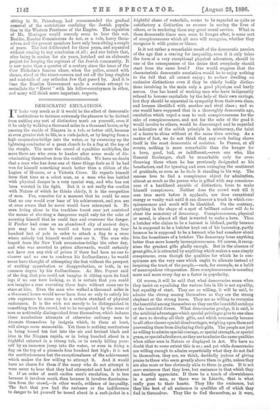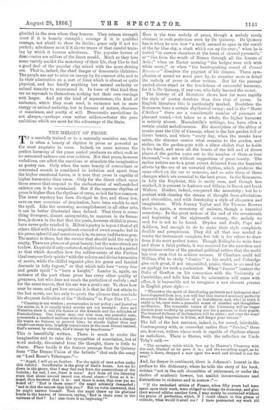DEMOCRATIC EMULATIONS.
IT looks very much as if it would be the effect of democratic institutions to increase extremely the pleasure to be derived from putting any sort of distinctive mark on yourself, even if it be only by walking a thousand miles in a thousand hours, or by passing the rapids of Niagara in a tub, or better still, because at even greater risk to life, in a cork-jacket, or by leaping from a high suspension-bridge into the water, or by swarming up the lightning•conductor of a great church to fix a flag at the top of the steeple. The more the crowd of equalities multiplies, the more there are who seem to hanker after some mode of dis- criminating themselves from the multitude. We have no doubt that a man who has done one of these things feels as if he had won for himself something much better than a ribbon of the Legion of Honour, or a Victoria Cross. He regards himself from that time as a select man, as a man who has battled with physical danger in a very special way, and who has not been worsted in the fight. But it is not really the conflict with Nature of which he thinks chiefly, it is the recognition of men. For, conceive for a moment that he could be sure that no one would ever hear of his achievement, and you are at once aware that he never would have attempted it. No man living alone in the trackless forest ever yet contrived the means of shorting a dangerous rapid only for the sake of assuring himself that he could face and overcome the danger. If Pircher had come on an abandoned city of ancient days, you may be sure he would not have swarmed up four hundred feet of pole in order to attach a flag to a cross where nobody but himself would ever see it. The man who leaped from the New York suspension-bridge the other day, and who was escorted to prison afterwards, would certainly not have run any risk of prison if there had been no one to observe and no one to condemn his foolhardiness ; be would never have thought of attempting the feat without the prospect of exciting approbation or disapprobation, or both, in no common degree by his foolhardiness. As Mrs. Poyser said of the dog, that you could not imagine it sitting upon its hind legs if no one were looking, so it is certain that you could not imagine a man executing these feats without some one to stare at him. Even the man who walked a thousand miles in a thousand hours would never have done so only to satisfy his own eagerness to come up to a certain standard of physical endurance. It is the wish not merely to be distinguished in something from the crowd, but to be recognised by the mass of men as noticeably distinguished from themselves, which induces these numberless attempts of otherwise ordinary men to decorate themselves by insignia which, to them at least, will always seem memorable. Yet there is nothing meritorious iu being tossed ten feet into the air and bruised black and blue in the Niagara rapids, or in being knocked about in a frightful cataract in a strong tub, or in nearly killing your- self by an immense jump into the water, or even in fixing a flag on the top of a pinnacle four hundred feet high ; it is not the meritoriousness but the exceptionalness of the achievement which makes the few willing to attempt it. And it would have no charm for them if the many who do not attempt it were never to hear that they had attempted and had achieved it. If an order of merit excites men's emulation, it is less because it involves merit, than because it involves discrimina- tion from the crowd,—in other words, evidence of inequality. The fact that you had the rashness or the indifference to danger to let yourself be tossed about in a cork jacket in a
frightful chaos of waterfalls, seems to be regarded as quite as satisfactory a distinction as success in saving the lives of others, or in rendering them any great moral service. What in these democratic times men seem to hunger after, is some sort of conspicuousness which all men will recognise, whether they recognise it with praise or blame.
Is it not rather a remarkable result of the democratic passion of the age that a craving for inequality, even if it only takes the form of a very exceptional physical adventure, should be one of the consequences of the desire that everybody should start from the same level ? One would suppose that the characteristic democratic emulation would be to enjoy nothing to the full that all cannot enjoy ; to eschew dwelling on exclusive distinctions even if they be chiefly bodily distinc- tions involving in the main only a good physique and hardy nerves. One has heard of working men who have indignantly refused to become capitalists by the help of their own savings, lest they should be separated in sympathy from their own class, and become identified with another and rival class ; and so one would have supposed that in a thoroughly democratic age, emulation which urged a man to seek conspicuousness for the sake of conspicuousness, and not for the sake of the good it would involve to others, would be discouraged and be regarded as indicative of the selfish principle in aristocracy, the taint of a desire to shine without at the same time serving. As a matter of fact, we do not think that any such feeling shows itself in the most democratic of societies. In France, at all events, nothing is more remarkable than the hunger for a hero, good, bad, or indifferent,—even one who, like General Boulanger, shall be remarkable only for over- throwing those whom he has previously designated as his benefactors, and for ignoring and even outraging the sentiment of gratitude, so soon as he finds it standing in his way. The masses love to find a conspicuous object for admiration, almost as much as the person who is gifted with any conscious- ness of a hardihood capable of distinction, loves to make himself conspicuous. Neither does the crowd wait till it sees true merit before it applauds, nor does exceptional energy or vanity wait until it can discover a track in which con- spicuousness and merit will be identified. On the contrary, anything in the shape of a spot of brilliant colour will do to cheer the monotony of democracy. Conspicuousness, physical or moral, is almost all that is wanted to make a hero. Thus a butcher who claims to be a baronet is idolised, partly because he is supposed to be a butcher kept out of his baronetcy, partly because he is supposed to be a baronet who had somehow about him the homeliness of a butcher. The democracy loves anything better than mere homely inconspicuousness. Of course, it recog- nises the greatest gifts gladly enough. But in the absence of great gifts, it is attracted by anything which makes a man simply conspicuous, even though the qualities for which he is con- spicuous are the very ones which ought to alienate instead of inspiring the trust of the people,—such, for example, as a habit of unscrupulous vituperation. Mere conspicuousness is counting more and more every day as a factor in popularity.
Of course, it will be said that what democracies mean when they insist on equalising the various lots in life is not equality, but equality of start. They are as willing, it will be said, to admire the strong among themselves as they are the strong elephant or the strong horse. They are as willing to recognise the beautiful among themselves as they are the beautiful antelope or the beautiful flower. What democracies grudge, it is said, is the artificial advantages which special privileges give to one class of men to develop all their gifts, and which necessarily become to all other classes special disadvantages, weighing upon them and preventing them from displaying their gifts. The people are just as willing to admire special courage, or special strength, or special grace, or special adroitness, as they are to admire the same qualities when either seen in Nature or displayed in Art. We have no doubt that to some extent this is so ; and yet while democracies are willing enough to admire superficially what they do not find in themselves, they are, we think, decidedly jealous of giving praise to those who seem greatly above them in gifts, unless they are also more or less obviously akin to them in grain. It is not mere eminence that they love, but eminence in that which they can heartily appreciate. If there be a touch of clownishness in a great man, as there was in Lincoln, that is what really goes to their hearts. They like the eminence, but they like best of all eminence in qualities all of which they find in themselves. They like to find themselves, as it were,
glorified in the man whom they honour. They esteem strength most if it is homely strength ; courage if it is qualified courage, not afraid to show its limits ; grace only if not too perfect ; adroitness most if it shows traces of that careful train- ing by which it became adroitness. The popular heroes of democracies are seldom of the finest mould. Much as they love some variety amidst the monotony of their life, they like to find a good deal of the popular clay mixed with the more shining ore. That is, indeed, the chief danger of democratic idolatries. The people are apt to seize on energy by its coarsest side, and to fix their admiration on a sort of force which is almost or quite physical, and has hardly anything but animal audacity or animal tenacity to recommend it. In force of that kind they see no reproach to themselves, nothing but their own cravings writ larger. And yet the kind of separateness, the kind of eminence, which they most need, is eminence not in mere energy or animal audacity, but in fineness of nature, clearness of conscience, and purity of will. Democratic emulations do not always,—perhaps even rather seldom,—foster the pure ambitions which are most for the advantage of the State.



































 Previous page
Previous page